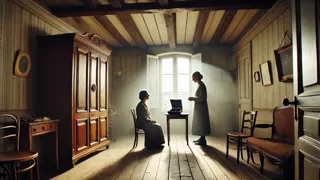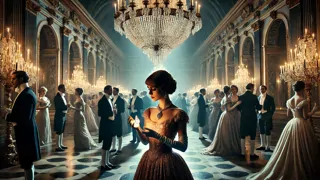Introduction
In the heart of Paris, winter of 1875 brought a pale glow through snow-laden streets, and the city’s gas lamps cast wavering halos atop frosted cobblestones. Amid this world of grandeur and grit lived Mathilde Dupont, a woman of delicate grace whose every glance betrayed a yearning for a life more splendid than her modest apartment could contain. Her husband, Henri, a diligent clerk, loved her gently and offered every humble comfort he could afford, yet saw his efforts swallowed by her silent longing for silk gowns and glittering jewels she felt destined to possess. One frosty morning, a single invitation arrived bearing the crest of the Countess de Brissac—an honor that set Mathilde’s heart alight with dreams of splendor and fear of inadequacy. How could she step beneath the chandeliers of the opera house in threadbare silk and bare neck? It was then that Madame Émilie Forestier, born to wealth but guided by kindness, extended a velvet box harboring a diamond necklace of extraordinary brilliance. “Wearing this,” Émilie whispered, “you will shine as you were meant to.” Mathilde, cheeks warmed by equal measures of pride and trepidation, lifted the necklace into the soft candlelight and felt in that moment as if she grasped her truest self. Little did she know that this single act of borrowed beauty would cast a far longer shadow, binding her fate to the fragile promise of radiance and the unforgiving turn of fortune.
The Borrowed Jewel and the Night of Splendor
Mathilde stepped into the grand foyer of the Countess de Brissac’s salon, her borrowed diamond necklace resting against pale skin like a cluster of captured stars. The polished marble floor reflected her trembling hemline, and every eye in the room seemed to draw toward her as she advanced beneath the tall archway. Murmurs of admiration trailed in her wake: whispers of a rose who had bloomed on winter’s breath. For the first time she felt grace beyond her station, each movement weighted by the sparkling promise clasped at her throat. The orchestra’s strings swelled, and she glided into the circle of dancing couples, Henri’s arm firm at her waist, his shy pride on full display.

The Vanishing and the Descent into Ruin
Mathilde and Henri returned home in the hush after midnight, their spirits still dancing on the memory of swirling silk. But the necklace, slipped with shame upon their return, was no longer at her throat. Panic seized Mathilde’s breath. They searched each corner of the carriage, overturned compartments, even retraced hurried footsteps across cold pavements. The Countess’s salon and the carriages offered no sign; it was as if the stars had fallen entirely from her sky. Fearing the Countess’s disapproval, they resolved to replace the jewels without word to Émilie.

They scoured jewelers, selecting a near-identical necklace at a vast sum. Henri borrowed from lenders whose names bore the weight of interest and diligence, wrapped their home in the first of many mortgages. They sold the few keepsakes they owned—silver spoons with engraved initials, a worn timepiece that had belonged to Henri’s father. Night after night, Mathilde counted the coins by candlelight, each flicker a reminder that the slightest misstep would mean ruin. The months passed in a blur of ledgers and labor; she traded the softness of her silk for the harsh tang of laundress water, while he took to second shifts at the Prefecture to pay for what they believed was genuine brilliance.
And under that stain of unrelenting debt, their marriage—once bright with hope—settled into quiet sacrifice. Yet never did Mathilde confess the truth to her friend, unable to face Émilie’s gentle eyes had she known the grave cost of her gift.
The Price of Pride and the Revelation
After a decade of toil, Mathilde’s delicate hands had lost their youth. Henri’s dark hair had glimmered with life now tinged silver. One crisp morning, chestnut trees outside their modest dwelling cast trembling shadows of autumn across worn thresholds, they finally repaid the last sou to every lender. Exhaustion clung to their bones like a damp cloak, yet a hesitant joy stirred in Mathilde’s chest: the weight of the replacement necklace—carefully packed—slid into its velvet case. At last, they could confront Émilie and restore what they had thought lost.

Émilie received them in a sunlit salon, anticipation shining in her gaze. Mathilde’s heart thumped with pride and dread as she produced the case, her voice trembling: “I present what I believed lost.” With slow fingers, she unveiled the necklace. To her astonishment, Émilie’s expression shifted from warmth to surprise. Gently, she removed her own string of diamonds and laid the genuine jewels upon the table. “My dear,” she said softly, “the necklace I lent you was only paste—an imitation created for the color of truth, not the weight of gold. I never risked a friend’s fortune on mere stones.”
In that moment, Mathilde felt a shudder pass through her. Every hardship, every borrowed sou, every tear shed at dusk rushed before her like a tidal wave. The years spent beneath the yoke of her pride washed away in a single revelation: she had suffocated her life on the altar of appearance when her friend’s mercy was never conditional on wealth or status.
Conclusion
Mathilde sank into a small chair by the window, the empty velvet case resting cold in her lap. The years of backbreaking labor, the loss of youth and grace—how could she ever repay the real gift she had overlooked? Henri slipped beside her, his quiet devotion etched into every line of his face. In that hush, she realized that beauty had never been in the diamonds she wore but in the depth of compassion extended to her without expectation. Pride had led her into a spiral of hardship, yet humility and love had delivered her from its grip. From that day forward, Mathilde carried no necklace around her neck, but she wore the memory of her friend’s mercy and the hard-earned wisdom of her own trials as the finest adornment of all.


















